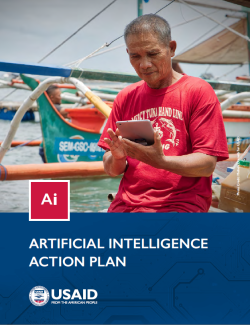Artificial intelligence (AI) technologies are increasingly prevalent in our lives—from digital voice assistants to personalized advertising and entertainment or advanced medical diagnostics. AI’s projected impact on the global economy by 2030 is equivalent to an increase in global GDP by 16%, and it is predicted to play a role in addressing each of the 17 UN Sustainable Development Goals. As AI proliferates across a broad range of markets, sectors, and country contexts, so too will AI’s benefits, but also misuse and AI-related harms. Development actors have a responsibility to ensure that appropriate measures are taken to promote AI’s positive potential and to protect those most at risk of being negatively impacted by its use.
As the leading international development donor, USAID must continue to prioritize the rights-driven, responsible use of digital technologies and data in our work. When we turn to AI, we must commit to do so with full appreciation of the technology’s potential for benefit and harm. For AI, this includes constructing appropriate safeguards, investing in relevant talent, and understanding how AI is connected with the broader digital ecosystem and the different stakeholders therein. It also includes working closely with digital rights partners and experts to help determine when AI technologies should not be used in our work — and when the rights-infringing use of AI by others may merit USAID lines of effort to address potential harms. Our approach is, and must continue to be, aligned with the two mutually reinforcing objectives of the USAID Digital Strategy: promoting the responsible use of digital technology for development, and working toward more inclusive, open, and secure digital ecosystems.
Check out the Artificial Intelligence Action Plan now to learn more about USAID's plan for engaging responsibly with AI in our programming and in the countries where we work.

